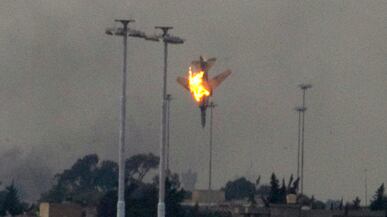As Western airstrikes began this weekend, Libyan residents fled their homes with just the clothes on their backs—and some of them are upset over the West's late actions. Babak Dehghanpisheh reports from Libya.
Dozens of cars streamed into the border crossing between Libya and Egypt yesterday evening. There were sedans with suitcases strapped on top and pickup trucks loaded high with cushions and furniture. Nearly all of the dust-covered vehicles had one thing in common: the number eight in the license plate, the code for Benghazi, the rebel capital which was brutally attacked by the forces of Muammar Ghaddafi on Saturday.
Cars honked their horns to get through the crowds and the smell of exhaust fumes was thick in the air. A small fight broke out as hustlers tried to take money from one panicked family. Wandering through this chaotic scene was Hana Gallal, 40, a member of the National Transitional Council, the government in waiting that the hopeful members of the opposition had cobbled together in Benghazi. "Today the international community failed us," she said, shaking with rage and grief. "We feel betrayed." Before joining the council as the human rights representative, Gallal, a petite woman who was wearing a dark coat and sneakers, used to teach law at a university in Benghazi. As the artillery shells and bombs slammed into the city this morning, Gallal just grabbed her children and fled. "I left without anything. Nothing. Just my passport," she said, choking up with emotion.
Photos: Intervention in Libya

When the United Nations Security Council passed a resolution justifying "all necessary measures" to protect civilians on Thursday, it finally looked like Ghaddafi may be on the ropes. Here were the world's biggest military powers—the U.S., Britain, and France—promising to crush the dictator's bloody onslaught against ordinary Libyans. Euphoric celebrations broke out in Benghazi. Ghaddafi appeared to have received the message: he declared a ceasefire. And then he showed the world what meant by a ceasefire.
The assault on Benghazi started early yesterday. "There was heavy artillery and bombing around seven in the morning," says Mustafa Abdullah, 31, a professor of archaeology at Ghar Younis university. "My kids and wife were freaking out." Abdullah didn't waste time; he packed his family into their red Nissan and blew out of town. As the morning progressed, the government forces plowed into Benghazi with tanks and armored personnel carriers, witnesses say. Gunfights broke out on the western edge of Benghazi and the casualties mounted. "There were bodies being taken to the hospital and many injured people in the street," says Abdul Rahman Fathallah, 30, a mechanic who also fled Benghazi this morning. "It was a massacre happening."
In mid-morning, a jet plunged out of the sky in flames on the edge of Benghazi. It appeared that the rebels were finally fighting back. But a short while later, opposition leaders announced that the jet was one of their own and it wasn't clear who exactly had shot it down. Rebels did set up defensive positions at various points around the city, witnesses say, but there didn't seem to be any organized defense, contrary to the claims of some opposition leaders. And the rebel defenses crumbled beneath the superior firepower of the Ghaddafi forces. "There's no military resistance at all," says Fathallah, the mechanic. "They're all retreating."
"Today the international community failed us," she said, shaking with rage and grief. "We feel betrayed."
Late in the day, the U.S. launched a barrage of cruise missiles and French fighter jets attacked Ghaddafi's forces. But the international help may have come too late. It's hard to see how strikes could tip the balance if the fighting in Benghazi drags out into messy urban combat. From thousands of feet in the air, it will be impossible for pilots to separate friend from foe, especially when fighters from both sides have squared off against each other in civilian clothes. Perhaps more importantly, the National Transitional Council, the fledgling opposition government has been demolished; there were even reports of a large explosion at the court house in central Benghazi this afternoon, the headquarters of the council.
Gallal isn't the only council member who escaped. A handful of others took shelter in Tobruk, a city near the Egyptian border. With reports that Ghaddafi's forces are marching up a desert highway toward Tobruk, it may not be long before these council members flee the country, too. And the dreams of a democratic state that they argued for so passionately may be snuffed out with their departure. "We screamed and we screamed. We said we have a just cause," says Gallal. "Now in my heart and soul I feel broken."
Babak Dehghanpisheh is Newsweek's Beirut Bureau Chief. He's been covering the Middle East for Newsweek since 2001.






